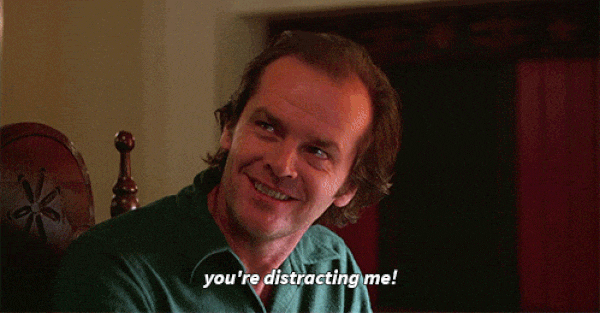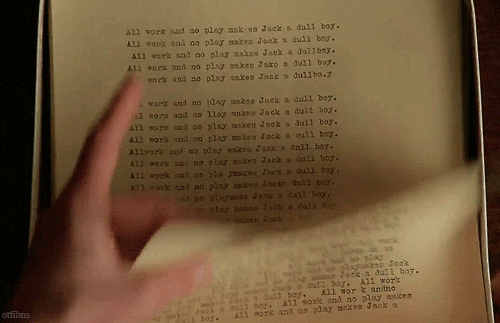How to Balance Your Day Job with Your Writing Passion

Not all of us can afford to leave our day job, move to an abandoned, snow-bound hotel for the winter and write. And, let’s face it, that doesn’t always turn out well, anyway.

So, how do you write while holding down a job and attending to all of your other responsibilities?
A lot of us are tempted to put off writing until we have more free time. But here’s the thing: More free time doesn’t automatically mean you’ll use that time to write. In fact, you’ll probably do everything but write. Perfect conditions are no guarantee of writing success.
Instead, you must make writing one of your top to-do’s, wedged right between your weekly grocery trip and your dry cleaning drop off.
You may think, that doesn’t sound very romantic. And it’s not. But most of writing isn’t romantic at all. It’s you staring at a screen and willing words to materialize. Or you staring at a notebook and doing the same thing. Or you just staring, full stop.
Here’s the good news: Writing requires just as much discipline as it does creativity. This means you can learn how to make writing a daily habit. It doesn’t have to compete with your day job. Below, let’s discuss the top tips for balancing what you have to do with what you want to do—and that’s write.
Here’s a list of inspiration from fellow writers you can print and post near your computer. Subscribe to receive this extra resource.
But First, Remember You’re in Good Company
Be encouraged. You don’t have to quit your day job to contribute a wonderful work of art to humanity. Many writers, from Bram Stoker to Lewis Carroll, managed to write unforgettable pieces of literature while working full time.
Here’s a partial list to inspire you:
Anne Rice
Anton Chekhov
Frank McCourt
Franz Kafka
Harper Lee
Herman Melville
J.K. Rowling
Jorge Luis Borges
Philip Larkin
Toni Morrison
T. S. Eliot
Wallace Stevens
William Carlos Williams
Virginia Woolf
Write Every Single Day. No Exceptions.
Those of us who write know that writing is not just a hobby; writing is fueled by a passion that flickers deep inside of the soul. Inextinguishable, this passion can only grow more intense when we actively attend it, and then, it threatens to consume all of our waking thoughts and haunt our dreams.
So, how can I possibly instruct you to write a rote 1,000 words every day between 6 to 8pm?
You’re not a robot—you’re an artist of passion.
True, but this bears repeating: Writing is a discipline. If you’ve ever overcome writer’s block, you know it happened because you wrote through it. The only way to write is to write.
The more you write, the better you become. You’ll type faster, think faster, create more ideas, refine those ideas, and then create even better ideas.
It all starts with a commitment to write daily. Some days you won’t feel like it, some days you will, but your feelings shouldn’t stop you from writing. Use those feelings as kindling for your fire. Besides, after you’ve established a daily writing routine, it’ll feel weird not to write.
Scheduling is Everything
You probably have a predetermined time when you’re scheduled to be at work. If you have other obligations, you may have a set time for those events as well: Drop the kids off at school at 7:45am, doctor’s appointment at 10:30am, meet with colleague for late lunch at 2pm, network mixer at 6:30pm, and so on. You’ve got a busy schedule, but that’s all the more reason to add writing to it.
You don’t want writing to be an afterthought. It needs to be part of your to-do list.
Keep a Notebook Handy
You never know when inspiration will hit you. Be prepared with a dedicated notebook that you carry with you everywhere. Post-its get lost, believe me. You need something substantial that you can keep up with.
I recommend going with a smaller, easy to tote notebook that you can stuff in your pocket. There are a lot of attractive options including Moleskine, Field Notes, Rhodia, and even Mead if you’re on a bare bones budget.
There’s something so very tactile when you write notes by hand. Personally, I find it relaxing.
However, if you can’t bare the thought of lugging one more item around with you, consider using an app on your phone. Use writer-friendly note taking apps like Transom and 1Writer to jot down your thoughts on the go.
Embrace the Distraction

You’re a writer, so I know one thing about your personality—you’re obsessive. You tend to hold characters, stories, plot lines, dialogue, and themes in your mind with unflinching preoccupation. Obsession often leads to mastery, but it can also lead to madness.
The good news is you have something to interrupt your fixation, and it’s one of the biggest benefits of working a full time job—distraction!
While you’re distracted with your day job, you get much needed distance from your story. That way, when you return to your characters, you’ll be able to see the story with a fresh perspective.
Find a Better Day Job
Sometimes your day job just sucks all the way around. It sucks the life out of you, to the point where you end each day barely coherent. The last thing you should do is log a couple more hours typing. You want to, but then it would turn into this:

“All work and no play makes Jack a dull boy.”
Sometimes, it’s just a good idea to quit your job (but not before you find another one). One day, you’ll get paid to write, but until that day comes, you’ll still need to pay your bills.
Find a job that won’t leave you brain dead at the end of the day. You need a job that doesn’t intrude into your non-work life.
Final Thoughts
Remember that all the time you have is right now. Don’t wait for someday when the conditions are just right to write. They’ll never be just right. They’ll always be another distraction—if not work, it’ll be something else. Make writing a priority and tell the story that only you can tell. Good luck!
Here’s a list of inspiration from fellow writers you can print and post near your computer. Subscribe to receive this extra resource.




